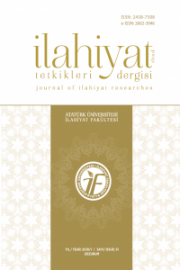Bakara Sûresi 184. Âyetin Neshi Meselesi ve Şah Veliyyullah ed-Dehlevî’nin Bu Konudaki Sıra Dışı Yorumu
The Issue of Naskh (Abrogation) of the Surah Al- Baqarah, 184 and the Unusual Interpretation of Shah Waliullah ed-Dehlawi on this Subject
Author(s): Yunus Emre GÖRDÜKSubject(s): Islam studies, Theory of Literature
Published by: Atatürk Üniversitesi İlahiyat Fakültesi
Keywords: Tafsir; Baqara; Mansukh; Naskh; Shah Waliullah; Dehlawi; Interpretation;
Summary/Abstract: Shah Waliullah Dehlawi (d. 1176/1762), a scholar from India, has a multitude of works that cannot be determined in many areas. One of them is a work “al-Fawż al-Kabir Fi Usul al-Tafsir”, which was written in the field of usul al-tafsir, the original language of which is Persian. In a part of the mentioned work he reviews mansukh verses which are limited to twenty-one in Suyuti’s (d. 911/1505) al-Itqan and reduces them to five. One of the verses referred to in this chapter is the 184th verse, which is accepted to have been abrogated by the 185th verse of the surah al-Baqara. In the Tafsir literature, it is stated that verse 184th was before and that Muslims were given the right to choose between fasting or feeding a needy person for each fasting day. This judgement (hukm) was later abolished by the 185th verse of the same surah and fasting was ordained (fard). Dehlawi thinks that this verse was not mansukh because according to him, this verse refers to the sadaqa al-fitr. This article contains an analysis of the aforementioned issue. As far as we can see, there is no one else who has such an unusual opinion and an approach. It is very interesting that the author’s making this interpretation by ignoring all the narratives (riwayahs) of sahaba (friends of prophet Muhammad [pbuh]) and the opinions of the Islamic scholars. It cannot be said that this is based on a sound interpretation methodology in terms of scientific criteria. Within this framework, it can be thought that the effort to reduce the abrogated verses as much as possible leads to such an approach. Also, it should not be overlooked that in this approach, his Sufi orientation and the tradition of ishari/mystical tafsir may have been effective, even if indirectly.
Journal: İlahiyat Tetkikleri Dergisi
- Issue Year: 2019
- Issue No: 51
- Page Range: 25-47
- Page Count: 23
- Language: Turkish

